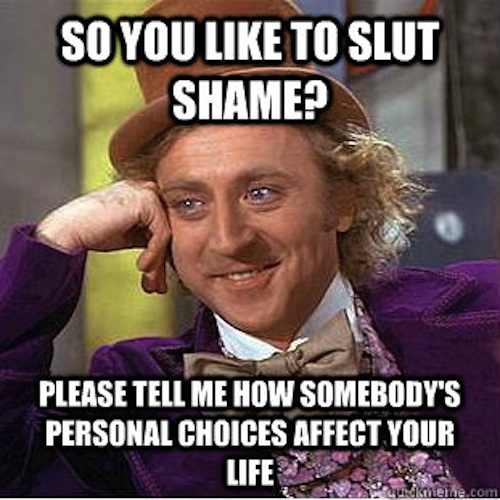I was at a wedding last November and in the midst of a conversation at the cocktail hour, a woman told me that she used to have a good relationship with her mother-in-law until said MIL “slut-shamed” her daughter. I looked over at her daughter, who was about 10 and running around pretending to be an airplane. I’m a dude, but I consider myself a pretty feminine-in-touch dude, and I couldn’t figure out for the life of me how you slut-shame a 10-year old. That said, I’ve had conversations with females since that wedding on this exact topic, and apparently it’s quite easy for a 10 year-old to be slut shamed, especially by her grandmother. You live and learn, I guess.
That’s why this article is pretty interesting: it’s based around research that came out of the writing of this book and essentially, it underscores the idea that everything in society is centered around “in-groups” and “out-groups.” To wit:
For her analysis, Armstrong divided the cohort in two, with wealthier women in one group and the working-class ones in the other. Each group tended to band together, with the poorer half feeling excluded from Greek life and other high-status social activities. Several of the low-income students, for example, balked at the cost of the $50 “rush” t-shirt, Armstrong said.
Armstrong notes that midway through their college experience, none of the women had made any friendships across the income divide.
To Armstrong, it seemed like even though the wealthy and poor women were slut-shamed roughly equally in private, it was mostly only the poor women who faced public slut-shaming. And it only seemed to happen when the poorer women tried to make inroads with the richer ones.
Here’s the other key takeaway:
One of the most striking things Armstrong learned was that, despite the pervasiveness of slut-shaming, there was no cogent definition of sluttiness, or of girls who were slutty, or even evidence that the supposedly slutty behavior had transpired. In the study, she notes that though “women were convinced that sluts exist” and worked to avoid the label, some of their descriptions of sluttiness were so imprecise (‘‘had sex with a guy in front of everybody”) that they seemed to be referring to some sort of apocrypha—“a mythical slut.”
“The term is so vague and slippery that no one knows what a slut was or no one knows what you have to do to be that,” she told me. “It circulated around, though, so everyone could worry about it being attached to them.”
Bhahaha — so being a slut is like the Supreme Court and pornography? You know it when you see it? Or is it like the word strategy in MBA classes: everyone tosses it around, but no one really has a clue what it actually means? The broader point being: how can you actually slut-shame if there’s no real conclusive definition of the word “slut?”
This is all increasingly relevant now for several reasons: Monica Lewinsky is back in the public eye, for one (and Hillary will probably be running for President); the latest shooting massacre in the U.S. supposedly originated because the shooter was pissed at “blond sluts” rejecting him; and with Instagram and Snapchat and Facebook and CyberDust and all that, what girls are doing at college is probably more trackable by other girls than ever before.
Also kind of telling: there are no major academic studies (to my knowledge) that come at slut-shaming from the guy side, i.e. how guys process information about who may or may not be a slut, the definitions, etc. Sadly, I’d assume that college-aged guys would be more drawn to those who have been slut-shamed, but I can’t be 100 percent sure. I can tell you that if you’re in college and perceive everyone around you to be getting action, but you’re not, sometimes you have moments where you want to seek out “an easier thing.” Those moments almost 100 percent backfire (I believe that’s called “karma” or “morality”).
What do y’all think? Can “slut-shaming” really exist without a tangible definition across female groups?
